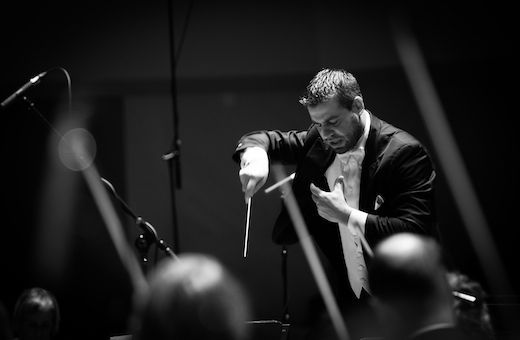Early in his tenure as the Detroit Symphony Orchestra’s 18th music director, Jader Bignamini had a true chance to show his mettle in leading a performance of Beethoven’s towering Ninth Symphony – a challenge by and large met with splendid results. Prefacing the main event was a recent work by American composer Hannah Lash, written expressly as a companion piece for the Beethoven that followed.

In his spoken remarks, Bignamini aptly described Lash’s 2019 work In Hopes of Finding the Sun as a “message of hope” – a topical work to program, and a thematic connection to the Ninth. It began with an astringent lyricism centered on the strings, and proceeded with a wonderful energy – certainly music to rejuvenate. The descending fifth motif which begins the Beethoven was heard quite prominently, but otherwise the parallels to the earlier work were more veiled and abstract. About a third of the way in, the chorus entered – comprised of the Detroit-based ensembles Opera MODO and Audivi – singing a text of Lash’s own device which loosely alluded to Schiller’s Ode to Joy, and matters concluded with a solo passage from chorus member Nicole Greenidge Joseph.
The bare fifths which opened Beethoven’s Ninth were indeterminate though pregnant with potential, defining the home key without yet revealing if major or minor. Vigor was quickly amassed, firmly opting for the minor, and Bignamini guided a tautly focused reading with dramatic urgency and often searing intensity. The Scherzo was surely no trifle, positively exuberant and given with clarity even at its rapid tempo, showcasing nearly every instrument. Its Trio was tinted by burnished cellos and amber brass, yet still taken at a nearly breathless pace. The slow movement was music of great repose, the composer’s vision of peace as its long, arching melodic lines unfolded.
The calm was abruptly shattered by the finale, in due course followed by a reminiscence of the considerable amount of material that preceded. The Ode to Joy theme was first present in the low strings, an almost magical moment, barely above a whisper and meticulously controlled. Bass Luiz-Ottavio Faria made the opening vocal entrance with a booming, unequivocal call to attention. Tenor Saimir Pirgu provided energy and charisma during his solo outing in the “Turkish” section. The women had fewer opportunities in the spotlight, but soprano Ailyn Pérez often bordered on the angelic, countered by the more mellow mezzo of Sasha Cooke. As a unit, the vocal quartet blended together harmoniously and with natural synergy, perhaps only outdone by the chorus in their rich tapestry of voices resounding even from behind a Covid mask. There’s a certain magic to a stage filled to the brim with musicians and a concert hall with nearly every seat occupied – a rather rare occurrence since the pandemic took hold, but how invigorating it was to be back there again.


